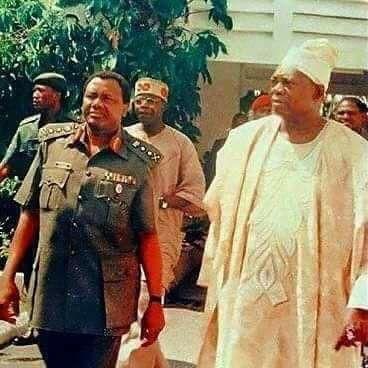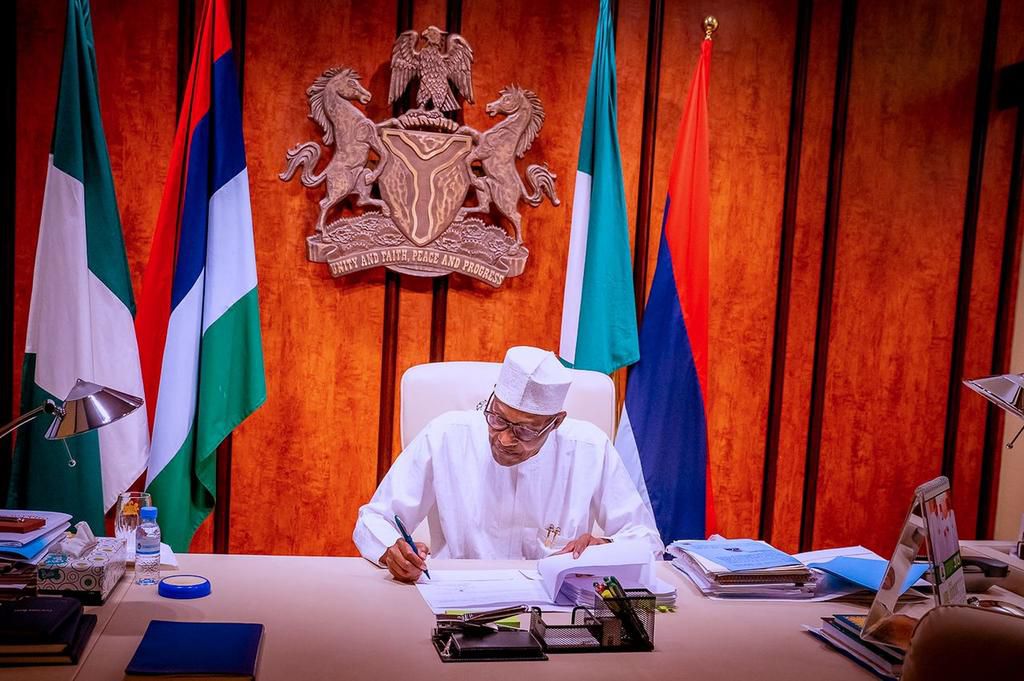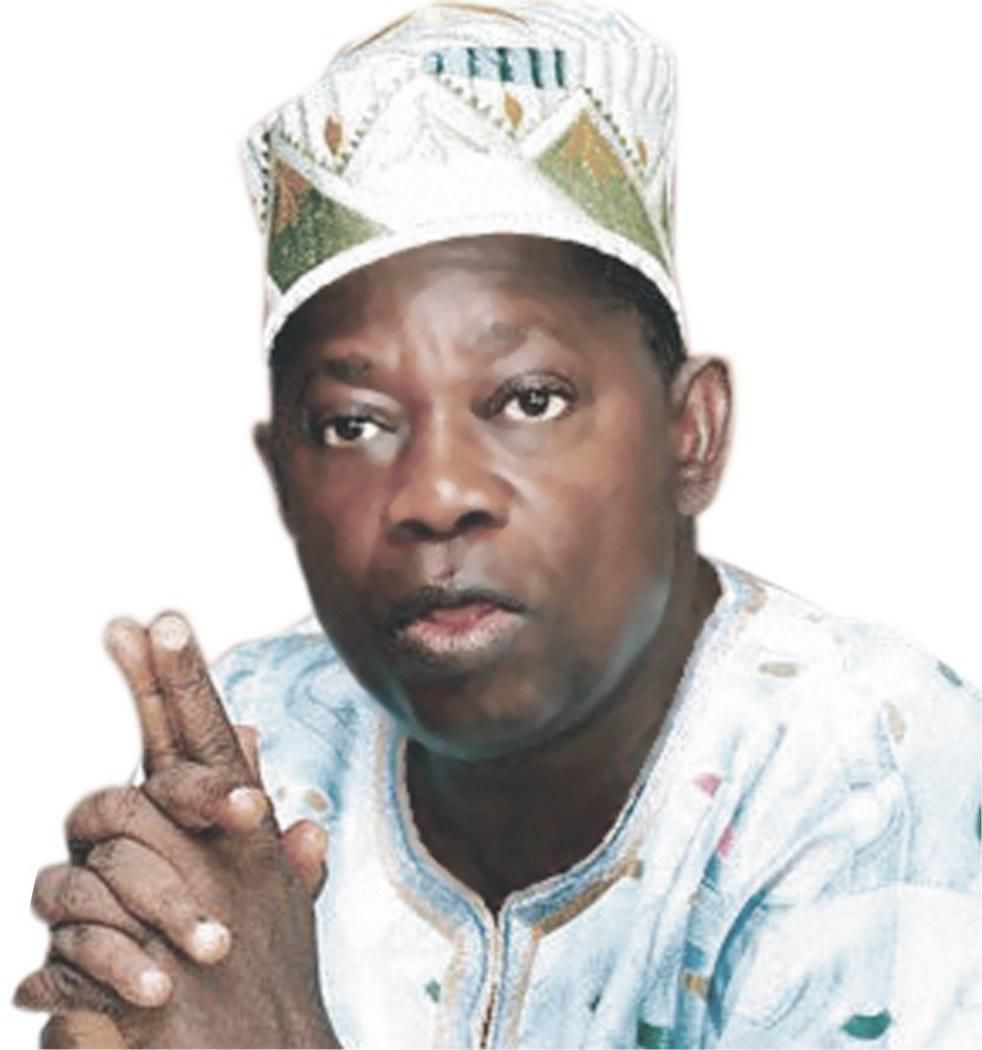June 12: How Abiola's legacy birthed Nigeria's Democracy Day
)
Chief Moshood Kashimawo Olawale (MKO) Abiola deservedly earned his place in Nigeria's history as the iconic symbol of democracy and embodiment of democratic struggle who etched June 12 in the nation's consciousness.
Though it may have passed as just another day in the Nigerian political calendar, an unfortunate twist of events ensured that June 12 became a rallying point for liberation, freedom, and social justice.
It was a day in 1993 when Nigerians enthusiastically went to the polls, buzzing with the hope of birthing a new, progressive country. The assignment was simple: install a democratic leader and return the military boys to the barracks.
Before this time, Nigerians had endured eight years of economic stagnation under the military regime of General Muhammadu Buhari, who came to power after the 1983 coup that toppled former President Shehu Shagari's government.
Buhari was ousted in a palace coup in 1985, paving the way for the emergence of General Ibrahim Babangida. Apart from public discontentment against his government, influenced by gross abuse of human rights, corruption, and falling social order, the Nigerian masses had grown weary of living under military regimes, hence the unanimous demand for transition to democracy.
ALSO READ: The June 12, 1993 Presidential Election: A defining moment in Nigeria's democratic journey
The popular opinion was that the nation had derailed from the trajectory it assumed at Independence in 1960. The promise of a just and democratic society had fast eroded, leaving the citizens disillusioned and yearning for a messiah.
)
Significance of Abiola's struggle
Then came MKO Abiola, a successful businessman and philanthropist, whose campaign promises reflected the hopes and yearnings of the masses. His popularity and infectious character endeared him to Nigerians in every corner of the country.
So, Babangida's annulment of the election dealt an irreparable blow to the nation's psyche. It was a hope-crushing decision that robbed many Nigerians of the chance of seeing their desired country.
But the citizens remained undeterred and kept the flame of the struggle alive, leading to Babangida’s exit and the subsequent coming of General Sani Abacha.
The struggle for June 12 continued under the Abacha regime. Despite the regime’s repressive disposition, Abiola never lacked the courage to sustain the fight for his mandate. That would later cost him freedom as he was arrested after the June 11, 1994, Epetedo declaration, where he proclaimed himself Nigeria’s democratically elected president.
While the philanthropist endured the solitary confinement of the military detention, Nigerians kept the flame of the struggle alive on the streets with protests and other forms of agitation.
Meanwhile, a glimmer of hope emerged after Abacha mysteriously died on June 8, 1998, offering a window for the realisation of the June 12 mandate as well as the liberation of millions of Nigerian citizens.
However, the hope quickly vanished just a month later as Abiola himself died under similarly mysterious circumstances.

Call for June 12 as Democracy Day
Abiola’s death didn’t put paid to the struggle for the June 12 mandate; instead, his demise intensified the call for a return to democratic rule.
This agitation pressured Abacha's successor, General Abdulsalami Abubakar, to begin the planned transition process quickly, leading to the 1999 presidential election.
After emerging as the winner, Olusegun Obasanjo was offered the opportunity to choose his swearing-in date in 1999. With many people hoping for June 12, Obasanjo opted for May 29, and the latter became Nigeria's Democracy Day.
However, South-West states, starting with Lagos, kept alive the significance of June 12 to Nigeria's democracy by declaring public holidays to honour MKO Abiola and his struggle.

Buhari's Declaration of June 12 as Democracy Day
However, the date gained national recognition on June 6, 2018, when then-President Muhammadu Buhari declared June 12 as the new date to celebrate Democracy Day.
The declaration nullified May 29 as Nigeria's Democracy Day - a tradition observed for 18 years.
"For the past 18 years, Nigerians have been celebrating May 29, as Democracy Day. That was the date when, for the second time in our history, an elected civilian administration took over from a military government.
"The first time this happened was on 1 October 1979. But in the view of Nigerians, as shared by his administration, June 12, 1993, was far more symbolic of democracy in the Nigerian context than May 29 or even the October 1," Buhari announced.
Subsequently, on June 11, 2019, Buhari assented to a Bill amending May 29, previously set aside as a public holiday for democracy celebration, replacing it with June 12.
ALSO READ: June 12: Pro‑democracy movement rises

What would Nigeria look like if June 12 had stood?
During his campaigns in 1993, Abiola reiterated messages portraying an optimistic future for Nigeria, with slogans such as "Farewell to poverty", "At last! Our rays of Hope", and "Burden of Schooling."
His message resonated with the masses because it reflected a strong commitment to address the most critical challenges at the time, including chronic poverty and falling education standards due to inadequate schools and poor remuneration of teachers.
On the economic front, Abiola proposed negotiations with foreign creditors and better management of the country's international debts. He also promised increased cooperation with the foreign community while presenting himself as someone the international community can trust.
These promises pointed towards an intention to implement radical reforms and wean the country off the burden of mindless borrowings, which had become the norm after Babangida launched the Structural Adjustment Program (SAP), with support from the International Monetary Fund (IMF) and the World Bank, to restructure the Nigerian economy.
In essence, Abiola would have probably succeeded in moving Nigeria away from a heavily import-dependent country to a productive and exporting economy.
)
Lessons for Nigeria’s democracy today
Nigerian democracy has come a long way. The Fourth Republic has been the longest streak the country has experienced since 1960, and this couldn't have been coincidental.
The June 12 struggle, culminating in the end of successive military regimes, was an essential indication of Nigerians' preference for civil rule. Unlike most other forms of governance, democracy guarantees the citizens' rights and freedom, making it an ideal option for a heterogeneous composition like Nigeria.
However, many would argue that the nation has failed to deepen democratic tenets and ethos as envisaged over three decades ago. The June 12 election remains a perfect reference for unity and cooperation.
For instance, Abiola ran on a Muslim-Muslim ticket, but religion was never an issue during the campaigns. At the same time, he defeated his primary challenger, Bashir Tofa, in his home state of Kano.
The above scenarios highlighted Nigerians' disdain for ethnic and religious considerations at the time. Unfortunately, the reverse is the case today, as religious and ethnic associations have been elevated above competence and integrity.
)
Has Abiola been adequately immortalised?
Though Abiola's memory is celebrated in Nigeria and internationally, a call persists for him to be adequately immortalised, especially by the Federal Government.
Since his death, the Lagos State Government has been observing June 12 as a public holiday. In 2018, other states, including Ogun, Oyo and Osun, followed suit to celebrate the 25th anniversary of the annulled 1993 presidential election.
Since 2019, June 12 has remained a public holiday in Nigeria, set aside to celebrate as democracy day, replacing May 29, with remembrance events arranged across Nigeria to mark the day.
Monuments were also named after him, including the Abuja National Stadium, now known as the MKO Abiola Stadium and Moshood Abiola Polytechnic, formerly the Ogun State Polytechnic.
Also, the Lagos State government under former Governor Akinwunmi Ambode erected the MKO Abiola Statue in the Ojota area of Lagos in honour of the late philanthropist.
However, critics insisted that these honours have not really compensated for Abiola's great sacrifice and selflessness.
)
![Aisha blows hot on Security forces; Y7ou won't believe what she said [VIDEO]](https://image.api.sportal365.com/process/smp-images-production/pulse.ng/17082024/1f976edf-1ee2-4644-8ba1-7b52359e1a8f?operations=autocrop(640:427))
)
)
)
![Lagos state Governor, Babajide Sanwo-Olu visited the Infectious Disease Hospital in Yaba where the Coronavirus index patient is being managed. [Twitter/@jidesanwoolu]](https://image.api.sportal365.com/process/smp-images-production/pulse.ng/16082024/377b73a6-190e-4c77-b687-ca4cb1ee7489?operations=autocrop(236:157))
)
)
)
)
)
)
)
)
)
)
)